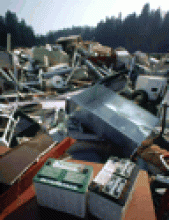- © 2006 CMA Media Inc. or its licensors
In my 30-plus years, I've never made a New Year's resolution. But I've watched other people make them.
The three perennial resolutions also happen to be the ones most often consigned to the dustbin: dieting, exercising and losing weight. Whenever I hear someone mention these as their resolutions, I think: you're doomed. It's like a death watch: a few weeks pass, the old behaviours return and New Year's Day wasn't life-changing or even important. It just serves to illustrate the futility of human beings changing themselves.
I've often wondered, regarding New Year's Day, whether people could be more original around their resolutions. The smokers inevitably resolve to stop smoking, the drinkers to stop drinking. Where are the resolutions to become space explorers? Or superheroes? President of the world? These goals are, to my mind, comparably achievable, just as likely to happen.
But cynicism hasn't been sitting as well with me lately. Sure, I have the accumulated evidence of decades of friends' failed resolutions. But I've never made any of my own, and it's easy to criticize if you're not a participant. This year, then, I've decided to actually make a resolution. I figure I'll start slow and only make one.
This gets at a larger issue, though: Are people capable of change?
I believe that many people aren't. Or, at best, not yet. I counsel people, suggest where things might be going wrong, where things are going right, where their energies might be better directed. The usual response I get is, “thanks for the therapy, doc, it is a lot clearer to me now, but I don't really want to do anything about it just yet.” Or people say that they will “do something” and promptly do nothing as soon as they walk out the office door. Only when things get desperate — when it hurts, when there are consequences — do people understand and embrace change. (Though that's not a given, either.)
Yet I have been surprised. A fraction of my patients actually do listen, actually do change. A typical case is the smoking obese man with high cholesterol and a family history of heart disease. I state the facts: “if things continue as they are, you are headed for trouble.” I expect nothing to change: after all, he's not short of breath, he's not having chest pain. Yet he does change: he starts eating healthier, he sheds pounds, he goes to the gym three times a week. And I think to myself: What did I say to make the transformation?
Well, after contemplating this for a while, I've realized that it probably wasn't specifically what I said. Any doctor could have delivered that speech. What was important was that this person was ready for change. I led him to water; he drank it of his own free will. And it's that drinking that's magical and mysterious: one can drink great draughts from the well of insight and learn all about one's problems, but to actually do something about it, that's much more difficult.
So, I have an overwhelming amount of anecdotal evidence that New Year's resolutions are at best temporary, at worst futile. Yet I have a small number of people in my practice who have taught me that change is indeed possible.
I think that's what New Year's resolutions are all about: the idea that our lives can be improved, that we can be better, that we can change. It's an ideal, but a practical one: we set a goal, we try to stick to it. I think this spirit is actually admirable and though it usually fails — due to slothful human nature — by virtue of being an ideal it goads us into change for our own good. Even if it means dispensing with little vices — jaywalking, for example — at the expense of larger ones, the carryover effect into our lives is immense. The lesson is immense: there is something to be done, change is possible.
I want to change. This year, I resolve to stop drinking as much coffee. I resolve to cut down to two cups a day.
It's not as Herculean or admirable a task as that undertaken by my earlier fellow, the heart-attack-waiting-to-happen. But it's a nasty little habit that's not doing my health much good, and the time has come for it to go. Will I hold myself to the same absolute standard as I held other New Year's resolvers: a rare success if I do succeed, a predestined failure if I do not?
No. I'll think, at least I tried to do something good, success or no. At least I've come over to the side of people who are trying self-betterment, defecting from the side of cynicism, the side of schadenfreude, the side that uses human inertia as its excuse for doing nothing. I've exchanged intransigence — knowing that there's a problem, appearing willing to change, but doing nothing to affect that change — for genuine motivation.
New Year's Day will be a good day. Perhaps it will be only an attempt; perhaps I'll be part of the resolutions brigade for only a short time. But the cynicism has been held at bay, and that, for me, is the most important change of all.
— Dr. Ursus

Figure. Photo by: Fred Sebastian











